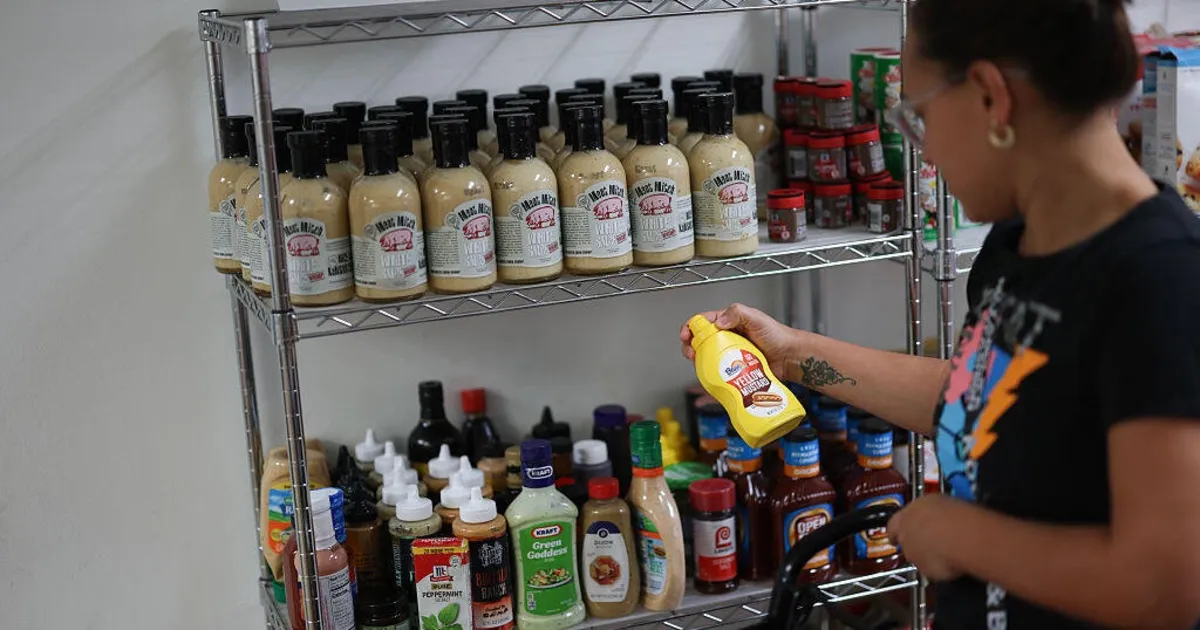
In a significant legal move, a coalition of officials representing half of the states and the District of Columbia has filed a lawsuit against the Trump administration. The lawsuit, initiated on Tuesday, challenges the administration's suspension of food stamp benefits amid the ongoing government shutdown, a situation that threatens to disrupt federal food aid for millions of Americans in the coming days.
The states involved in the lawsuit—including California, New York, and Pennsylvania—are urging a federal judge in Massachusetts to compel the Department of Agriculture to continue providing benefits through the Supplemental Nutrition Assistance Program (SNAP) for November. They are seeking to utilize a contingency fund designed to ensure that food assistance remains available for over 25 million people who depend on these benefits within their states.
Officials argue that the Trump administration's decision to halt food stamp payments, which serve approximately 42 million individuals nationwide, is unlawful and will strip millions of Americans of essential food benefits. These benefits are crucial in combating food insecurity and hunger, as highlighted in the lawsuit. They assert that the cessation of SNAP benefits will negatively impact public health and well-being, ultimately leading to increased costs for the states as they manage the repercussions of food scarcity.
State officials have expressed grave concerns about the health risks associated with the loss of SNAP benefits. They note that food insecurity, hunger, and malnutrition can lead to adverse health outcomes, particularly in children. These outcomes can include poor concentration, decreased cognitive function, fatigue, depression, and various behavioral problems.
The coalition comprises states such as Arizona, Colorado, Connecticut, Delaware, Hawaii, Illinois, Kansas, Kentucky, Maine, Maryland, Massachusetts, Michigan, Minnesota, Nevada, New Jersey, New Mexico, North Carolina, Oregon, Rhode Island, Vermont, Washington, and Wisconsin. This diverse group underscores the widespread impact of the suspension of food stamp benefits across the nation.
As the government shutdown continues, the Trump administration announced last week that federal food aid would not be distributed on November 1. This decision came after the Department of Agriculture opted not to access approximately $5 billion in contingency funds to maintain food stamp program operations. The agency attributed the lack of funding to Democratic lawmakers' refusal to support a House-passed stopgap bill aimed at funding the government.
The USDA's handling of contingency funds has sparked controversy. While the agency's plan, issued on September 30, suggested that multi-year contingency funds could be used for state administrative expenses to continue SNAP operations during a shutdown, a subsequent memo clarified that these funds are not legally available for regular benefits. Instead, they are earmarked for disaster relief, as exemplified by Hurricane Melissa, which recently impacted Jamaica.
Yet, state officials argue that this interpretation contradicts previous guidance provided during the last government shutdown in January 2019, which indicated that limited funding from contingency reserves could be used to provide benefits. This inconsistency raises questions about the administration's commitment to ensuring food security for vulnerable populations.
New York Attorney General Letitia James emphasized the urgency of the situation, stating, “Millions of Americans are about to go hungry because the federal government has chosen to withhold food assistance it is legally obligated to provide.” She described SNAP as one of the most effective tools to combat hunger and stressed that the USDA has the necessary funds to keep it operational.
The Trump administration has intensified pressure on Democrats to reopen the government by announcing cuts to federal funding for programs in blue states and issuing layoff notices to thousands of federal workers. The ongoing shutdown, now entering its 28th day, is on track to become the second-longest in U.S. history.
In light of the looming suspension of food stamp payments, some states are exploring ways to continue assistance for beneficiaries. Currently, about 1 in 8 Americans rely on food stamps, with recipients averaging $187 on prepaid cards for grocery purchases. The potential lapse in food stamp benefits has garnered attention from both Republicans and Democrats.
In a bipartisan effort, GOP Senator Josh Hawley from Missouri has introduced legislation aimed at ensuring continued funding for the food assistance program during the shutdown. This proposal has received backing from ten other Republican senators and Democratic Senator Peter Welch of Vermont, indicating a growing concern across party lines regarding the impact of the shutdown on food security.
As the lawsuit unfolds, the future of food stamp benefits for millions remains uncertain, highlighting the critical intersection of government policy, public health, and the ongoing struggle against hunger in America.